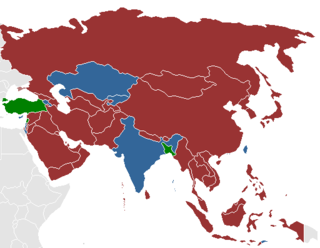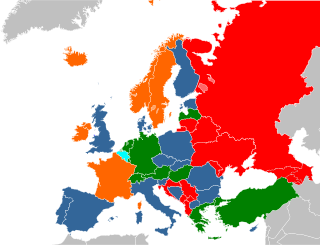
The Mann Act, previously called the White-Slave Traffic Act of 1910, is a United States federal law, passed June 25, 1910. It is named after Congressman James Robert Mann of Illinois.

Prostitution in Germany is legal, as are other aspects of the sex industry, including brothels, advertisement, and job offers through HR companies. Full-service sex work is widespread and regulated by the German government, which levies taxes on it. In 2016, the government adopted a new law, the Prostitutes Protection Act, in an effort to improve the legal situation of sex workers, while also now enacting a legal requirement for registration of prostitution activity and banning prostitution which involves no use of condoms. The social stigmatization of sex work persists and many workers continue to lead a double life. Human rights organizations consider the resulting common exploitation of women from East Germany to be the main problem associated with the profession.

An eingetragener Verein, abbreviated e. V., is a legal status for a registered voluntary association in Germany. While any group may be called a Verein, registration as eingetragener Verein confers many legal benefits, because it confers the status of a juridical person rather than just a group of individuals. The legal status must be mentioned in the name as well. Like certain other corporate bodies, an eingetragener Verein can apply for the status of a charitable organization.

Prostitution in Taiwan was made illegal under a 1991 law. Legislation was introduced in 2011 to allow local governments in Taiwan to set up "special zones" where prostitution is permitted. Outside these zones prostitution is illegal. As of 2017 no "special zones" had been opened.
An unenforceable contract or transaction is one that is valid but one the court will not enforce. Unenforceable is usually used in contradiction to void and voidable. If the parties perform the agreement, it will be valid, but the court will not compel them if they do not.

Prostitution is legal in India, but a number of related activities including soliciting, kerb crawling, owning or managing a brothel, prostitution in a hotel, child prostitution, pimping and pandering are illegal. There are, however, many brothels illegally operating in Indian cities including Mumbai, Delhi, Kolkata, Bangalore, and Chennai. UNAIDS estimate there were 657,829 prostitutes in the country as of 2016. Other unofficial estimates have calculated India has roughly 3–10 million prostitutes. India is widely regarded as having one of the world's largest commercial sex industry. It has emerged as a global hub of sex tourism, attracting sex tourists from wealthy countries. The sex industry in India is a multi-billion dollar one, and one of the fastest growing.

Prostitution is illegal in the vast majority of the United States as a result of state laws rather than federal laws. It is, however, legal in some rural counties within the state of Nevada. Additionally, it is decriminalized in the state of Maine. Prostitution nevertheless occurs elsewhere in the country.
Prostitution in Denmark was partly decriminalised in 1999, based partly on the premise that it was easier to police a legal trade than an illegal one. Third-party activities, such as profiting from brothel administration and other forms of procuring, remain illegal activities in Denmark, as do pimping and prostitution of minors.
Prostitution in Austria is legal and regulated.
Prostitution in Switzerland is legal and regulated; it has been legal since 1942. Trafficking, forcing people into prostitution and most forms of pimping are illegal. Licensed brothels, typically with a reception and leading to several studio apartments, are available. One estimate puts the number of street sex workers in Zurich at 5,000.
Prostitution in South Africa is illegal for both buying and selling sex, as well as related activities such as brothel keeping and pimping. However, it remains widespread. Law enforcement is poor.

Prostitution is the business or practice of engaging in sexual activity in exchange for payment. The definition of "sexual activity" varies, and is often defined as an activity requiring physical contact with the customer. The requirement of physical contact also creates the risk of transferring diseases. Prostitution is sometimes described as sexual services, commercial sex or, colloquially, hooking. It is sometimes referred to euphemistically as "the world's oldest profession" in the English-speaking world. A person who works in this field is called a prostitute, and sometimes a sex worker, but the words hooker and whore are also sometimes used to describe those who work as prostitutes.

The legality of prostitution in Europe varies by country.
This is an overview of prostitution by region.

Prostitution laws varies widely from country to country, and between jurisdictions within a country. At one extreme, prostitution or sex work is legal in some places and regarded as a profession, while at the other extreme, it is considered a severe crime punishable by death in some other places.A variety of different legal models exist around the world, including total bans, bans that only target the customer, and laws permitting prostitution but prohibiting organized groups, an example being brothels.
An "eG" or eingetragene Genossenschaft is a "registered cooperative society" under German Law. Unregistered cooperatives are also possible in Germany but practically never used in practice. In 2004 there were 5470 registered cooperative societies.

Transgender rights in the Federal Republic of Germany are regulated by the Transsexuellengesetz since 1980, and indirectly affected by other laws like the Abstammungsrecht. The law initially required transgender people to undergo sex-reassignment surgery in order to have key identity documents changed. This has since been declared unconstitutional. The German government has pledged to replace the Transsexuellengesetz with the Selbstbestimmungsgesetz, which would remove the financial and bureaucratic hurdles necessary for legal gender and name changes. Discrimination protections on the basis of gender identity and sexual orientation vary across Germany, but discrimination in employment and the provision of goods and services is in principle banned countrywide.

The Prostitutes Protection Act (Prostituiertenschutzgesetz) is a German Federal Law that was enacted on 21 October 2016 and came into force on 1 July 2017. Core elements are the introduction of a permit requirement for all prostitution trades and a registration certificate for prostitutes. The intent of the law was to better protect prostitutes and fight crime. Interest groups criticized the law, which they claim penalizes and endangers prostitutes and a constitutional complaint was filed in June 2017.

Im Winkel, together with Gußstahlstraße, has been the red-light district of Bochum, Germany, since the early part of the 20th century. The local names for the street are "Eierberg", "Gurke", "Riemenschleifer" (belt-grinder) or "Riemenwalzwerk".
The Linienstraße is a street in Dortmund, Germany, known for prostitution. The street is located north of the city's main railway station Dortmund Hauptbahnhof in the Stadtbezirk Innenstadt-Nord district. There have been brothels on Linienstraße since the beginning of the 20th century. Under the "Sperrbezirk" regulations, prostitution in central Dortmund is only permitted in Linienstraße.












